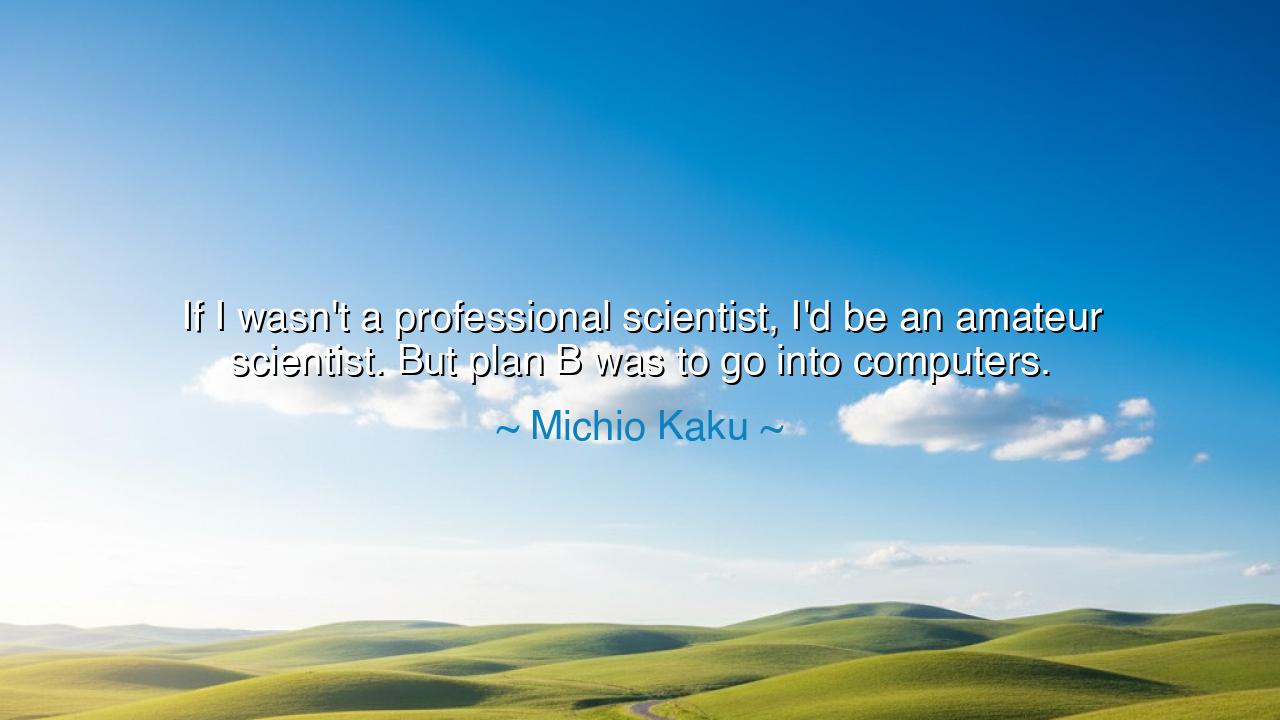
If I wasn't a professional scientist, I'd be an amateur
If I wasn't a professional scientist, I'd be an amateur scientist. But plan B was to go into computers.






The great physicist and visionary Michio Kaku, a man whose mind has long danced among the stars, once said: “If I wasn’t a professional scientist, I’d be an amateur scientist. But plan B was to go into computers.” In these words lies not merely a casual reflection on career paths, but a revelation of devotion, destiny, and the sacred fire of curiosity that drives the human spirit. Kaku’s declaration is a hymn to the love of knowledge, a reminder that true passion is not bound by profession or title. The one who truly seeks to understand the universe would do so whether he is crowned in honors or working in silence by candlelight.
When Kaku speaks of being an amateur scientist, he speaks the ancient truth that the desire to know—to question, to explore, to discover—is not a trade but a calling. The word “amateur” itself, from the Latin amator, means “one who loves.” Thus, to be an amateur scientist is not to be lesser, but to be one who seeks truth for the sheer love of it. He reminds us that greatness is not measured by rank or salary, but by the depth of one’s wonder. The professional may work for recognition, but the lover of knowledge works for joy.
The story of Michio Kaku’s youth is itself a testament to this devotion. As a boy, he built his own particle accelerator in his parents’ garage, using scrap metal and broken electronics. With no degree, no laboratory, and no funding, he pursued the mysteries of physics simply because he had to. Such is the mark of a true seeker. The ancients would have called this the “divine madness” of inquiry—the same sacred fire that burned in Archimedes, who cried “Eureka!” in his bath, and in Galileo, who gazed through his telescope knowing his truths might cost him freedom. The pursuit of knowledge, when born of love, cannot be confined by circumstance.
Yet, there is also humility in Kaku’s words. His “plan B,” to go into computers, shows that he is no idealist lost in abstraction. He acknowledges the practical world, the need to survive, to work, to build a bridge between passion and livelihood. This, too, is wisdom. For even the dreamer must sometimes bow to the winds of reality. But his statement also reveals the harmony between the two worlds—science and computation, discovery and creation. For the computer, like the telescope or the atom-smasher, is a tool of exploration. In both paths, he saw the same truth: the human mind reaching outward, using the power of logic and imagination to shape the unknown.
Kaku’s words recall the spirit of the Renaissance, when men like Leonardo da Vinci and Copernicus refused to separate art from science, or passion from practice. Leonardo, had he not painted, would have dissected bodies or studied the flight of birds; Copernicus, had he not been an astronomer, would have been a mathematician or philosopher. In each case, the spirit of inquiry was larger than any profession—it was the very breath of their being. Likewise, Kaku’s declaration that he would remain a scientist “amateur or not” reflects this timeless truth: that the love of knowledge is not something one chooses—it is something one is.
The lesson, then, is radiant in its simplicity: love what you do so completely that no failure, no change of fortune, can take it from you. Whether you labor in a great laboratory or in a quiet room at night, let your curiosity burn unceasingly. The true seeker of wisdom does not wait for recognition or permission. He studies because he must, he dreams because he cannot do otherwise. Whatever your field—art, science, writing, craft—let your devotion to it be so deep that even without reward, you would still give your life to it. For such devotion alone leads to mastery.
So, my children of the modern age, remember Michio Kaku’s wisdom. Do not measure your purpose by title or wealth. Whether you are a professional or an amateur, let the heart, not the world, define your worth. If you must have a “plan B,” let it be one that still serves your passion, one that keeps you near the flame of your purpose. For when your work is an expression of love, even the most ordinary life becomes luminous. As Kaku reminds us, the truest scientist, the truest artist, the truest soul, is not the one crowned by others—but the one whose joy is found in the endless pursuit of understanding.
And thus, let this teaching be passed on: Do not seek greatness—seek truth. For the one who serves truth with love, in any form, will find that greatness follows of its own accord, as the light follows the rising of the sun.






AAdministratorAdministrator
Welcome, honored guests. Please leave a comment, we will respond soon